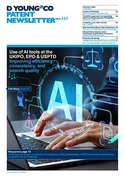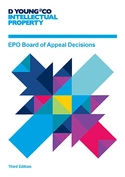UK High Court rejects AI inventors
Readers may be aware of the increased interest in the question of whether an artificial intelligence can be named as an inventor of a patent application. The UK High Court has now issued a decision on the appeal raised by Dr Thaler regarding whether his AI named “DABUS” can be named as an inventor of his UK patent applications.
This decision runs alongside a decision earlier this year from the EPO which concluded that an inventor of a patent must be a natural person. The corresponding news statement released by the EPO summarises the decision:
“In its decisions, the EPO considered that the interpretation of the legal framework of the European patent system leads to the conclusion that the inventor designated in a European patent must be a natural person. The Office further noted that the understanding of the term inventor as referring to a natural person appears to be an internationally applicable standard, and that various national courts have issued decisions to this effect.
Moreover, the designation of an inventor is mandatory as it bears a series of legal consequences, notably to ensure that the designated inventor is the legitimate one and that he or she can benefit from rights linked to this status. To exercise these rights, the inventor must have a legal personality that AI systems or machines do not enjoy.
Finally, giving a name to a machine is not sufficient to satisfy the requirements of the EPC mentioned above.”
EPO rejects AI inventor patent applications
Our earlier article regarding the EPO's rejection of European application number 18275163.6 published 14 February 2020.
Read moreThe decision of the High Court comes to a similar conclusion: an AI is not a person and an AI is not an inventor.
The High Court’s reasoning
According to the decision, the term "inventor" in the Patents Act 1977 only includes natural persons, thus excluding AI systems. In proceedings before the UKIPO, Dr Thaler explicitly stated that he was not the inventor and should not be named as such. He says DABUS is the inventor, whilst conceding that DABUS is not a person. Justice Marcus Smith of the High Court noted in his decision that:
“Even if I accepted that DABUS was capable of being an “inventor” – which, for the reasons I have given, I do not – Dr Thaler’s application would be hopeless, because DABUS would – by reason of its status as a thing and not a person – be incapable of conveying any property to Dr Thaler. In short, the ability to transfer, which DABUS lacks, is fatal to Dr Thaler’s contentions. The same point can be put in a different way: because DABUS is a thing, it cannot even hold property, let alone transfer it.”
This is broadly consistent with the reasoning applied by the EPO in making their decision of the same outcome, where they asserted that machines do not have legal personality and cannot own property.
The issue essentially boils down to how a machine doesn’t have the ability to transfer the right to apply for a patent to a natural person:
“Dr Thaler is a person quite capable of being the transferee of a property right. The problem that he has is that there is nothing to be transferred to him and nobody capable of transferring it. This difficulty was highlighted in Dr Thaler’s inability to identify any mechanism or transaction (whether within section 7(2)(b) or (c) or otherwise) whereby rights could pass to him. The best that Dr Thaler could do was to rely on his ownership and control of DABUS, which for the purposes of this appeal I am prepared to accept.”
How does this affect other areas of IP?
As noted when we reported on the EPO decision, a number of questions arise when comparing AI invention to, for example, computer generated works in UK copyright law (see Section 9(3) of the Copyright, Designs and Patents Act 1988) which sets out how the author of the computer generated work is taken to be the person who made the arrangements necessary for the creation of the work.
Justice Smith commented on this in his decision, drawing on an analogy that the owner of a fruit tree is the owner of the fruits of the tree. He notes, however, that no such rules have been framed in the context of patents, and that patents give rise to particular difficulties in that unlike copyright (or the hypothetical fruit tree), merely inventing something does not result in a patent being granted. A patent must be applied for, and that must be done by a person. Simply because DABUS invented something and Dr Thaler owns BADUS does not mean that Dr Thaler is entitled to apply for a patent.
Conclusion
This decision joins that of the EPO in setting out that AI cannot, according to the law as it stands, be regarded as an inventor. As noted by Justice Smith, the role of the courts is to apply the law as it is rather than question how the law should be, such that the matter of the recognition of AI in all areas of the law is rather a question of policy instead of something that the courts can shoehorn into existing legislation.

